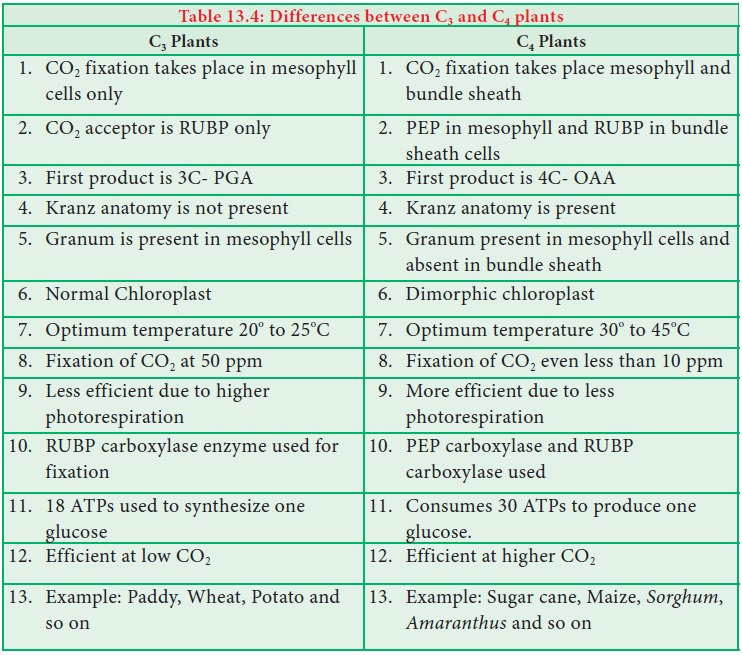Photosynthesis | Plant Physiology (Functional Organisation) | Botany - Answer the following questions | 11th Botany : Chapter 13 : Photosynthesis
Chapter: 11th Botany : Chapter 13 : Photosynthesis
Answer the following questions
Plant Physiology (Functional Organisation)
Photosynthesis
6. Two groups (A & B) of bean plants of similar size and same leaf area were placed in identical conditions. Group A was exposed to light of wavelength 400-450nm & Group B to light of wavelength of 500-550nm. Compare the photosynthetic rate of the 2 groups giving reasons.
Answer:
ŌĆśAŌĆÖgroup of plants exposed to
light of 400 - 450nm. Chlorophyll a shows maximum absorption peak at
450nm (blue region). Hence rate of photosynthesis was high.
ŌĆśBŌĆÖ group of plants exposed to
light o f 500 - 550nm. This wavelength refers to green region of
the spectrum. Chlorophyll does not absorb light in the green region but
reflects green. So plants appear green rate of photosynthesis was negligible in
these plants.
7. A tree is believed to be releasing oxygen during night time. Do you believe the truthfulness of this statement? Justify your answer by giving reasons?
Answer:
It
is a belief that some trees such as Aloe vera Peepal tree, some palm varieties
grown as indoor plants release oxygen during night time. There is no scientific
evidence for this So it is not true. This is because oxygen is evolved during
the light reaction of photosynthesis only. This reaction occurs only in the
presence of light. Therefore oxygen cannot be released during night time.
8. Grasses have an adaptive mechanism to compensate photorespiratory losses-Name and describe the mechanism.
Answer:
The
photo respiratory losses are checked by certain grasses by having physiological
adaptation. The process of photosynthesis occurs in mesophyll cells and bundle
sheath cells.
Mesophyll cells:
a)
Initially CO2 is taken up by Phosphoenol pyruvate (PEPA) (3C) and
changed to oxaloaccetate (4C) in the presence of PEP carboxylase.
b)
Oxaloccetate is reduced to Malate/Aspartate. The product formed reaches the
bundle sheath.
Bundle Sheath:
a)
The oxidation of Malate and Aspartate occurs with release of carbon di oxide
and formation of Pyruvate (3C)
b)
Due to increased CO2 concentration RUBISCO, functions as carboxylase
and not as Oxygenase.
c)
The photosynthetic losses are prevented.
d)
RUBP operates now under calvin cycle and pyruvate transported back to Mesophyll
cells is changed into Phosphoenol pyruvate to keep the cycle going.
9. In Botany class, teacher explains, Synthesis of one glucose requires 30 ATPs in C4 plants and only 18 ATPs in C3 plants. The same teacher explains C4 plants are more advantageous than C3 plants. Can you identify the reason for this contradiction?
Answer: C4 Plants
are more advandageous than C3
plants because of the following reasons:

C3 Plants
ŌĆó CO2 fixation
occurs in mesophyll cells only
ŌĆó RUBP is the
only CO2 acceptor
ŌĆó
Fixation of CO2 occurs if the atmospheric concentration of CO2
is 50 ppm only
ŌĆó
Optimum temperature is 20┬░ to 25┬░C
ŌĆó RUBP carboxylase enzyme
also functions as oxygenase if the O2 concentration is higher than
carbon dioxide
ŌĆó Higher rate of photorespiration and
hence rate of photosynthesis is reduced.
C3 Plants
ŌĆó
CO2 fixation occurs in mesophyll and bundle sheath cells
ŌĆó PEPA
Phosphoenol pyruvate in mesophyll is the acceptor in the first phase
ŌĆó
It can fix carbon di oxide even if the atmospheric concentration of CO2
is below l0ppm
ŌĆó
Optimum temperature is 30┬░ to 45┬░C and is thus effective in tropical regions.
ŌĆó PEP carboxylase enzyme
functions even at low carbon ŌĆō di - oxide concentrations.
ŌĆó Minimal rate of
photorespiration is seen is C4 plants.
10. When there is plenty of light and higher concentration of O2, what kind of pathway does the plant undergo? Analyse the reasons.
Answer:
Photorespiration
is the excess respiration taking place in photosynthetic cells due to absence
of CO2 and increase of O2. This condition changes the
carboxylase role of RUBISCO (RUBP carboxylase oxygenase) enzyme into oxygenase.
C2 cycle or photorespiration, begins and operates in the
chloroplast, Peroxisome and Mitochondria.
It
protects, photosynthetic cells from photooxidative damage.
Related Topics